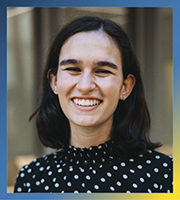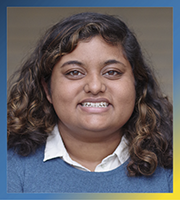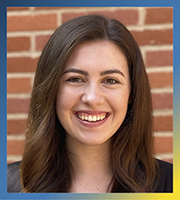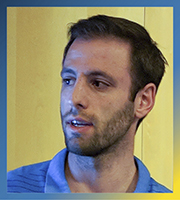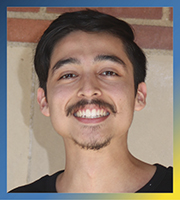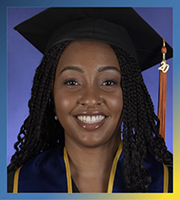
Each year the individual departments of the UCLA Samueli School of Engineering, and the school as a whole, bestow honors on graduating students who have made special contributions and have distinguished accomplishments. Below is an overview of this year’s school-wide recipients.
Mariam Carson
2020 Outstanding Bachelor of Science Award
Carson graduates with a degree in bioengineering and minor in Spanish. She earned Summa Cum Laude and Phi Beta Kappa honors and also received the Bioengineering Department’s outstanding bachelor’s degree award. She was a member of Professor Daniel Kamei’s laboratory and held multiple officer positions in the Biomedical Engineering Society at UCLA. She was also a member of Engineers Without Borders, working to build a schoolhouse in Nicaragua. Following graduation, Carson will be pursuing a graduate degree in global health sciences at the University California, San Francisco.
Q&A
You were part of Professor. Kamei’s laboratory for the last couple of years. What did you work on?
The Kamei Laboratory focuses on point-of-care diagnostics, which means we work to design diagnostic tests for infectious diseases that are inexpensive, user-friendly, and require minimal power sources. That way, these tests can be implemented in resource-poor settings that might not have the laboratory equipment and trained professionals required to execute complex testing protocols. These tests also have the potential to be used for mass screening of individuals, which is especially relevant since mass testing has been a big issue during COVID-19. I mainly work on nucleic acid amplification tests, which detect viral or bacterial genetic material instead of antibodies against the pathogen. When COVID-19 hit, we pivoted our current projects to focus on creating these types of diagnostic tests for SARS-CoV-2 (the coronavirus that causes COVID-19).
What was your most rewarding experience at UCLA, and why?
The best decision I made was to join the Biomedical Engineering Society (BMES). Our major is relatively small, and this was a great way to establish really close connections with other students and faculty in the Department of Bioengineering. I was pretty quiet as a freshman, but the mentorship I received helped me build confidence and create a network of support that allowed me to be successful in college. BMES helped me refine my goals and connect me with the lab that best fit my research interests, as well as point me in the right direction for my postgraduate path. I now hold a leadership position within the club, and have found that mentoring and connecting underclassmen with resources to accomplish their own goals has been extremely rewarding.
What motivated you to pursue a master’s degree in global health sciences at UC San Francisco after graduation?
Ironically, one of my career goals is to work to fight against disease outbreaks. Even though we are all in quarantine, this pandemic has solidified that this is something I really want to do, especially in developing countries. A lot of faculty members in the Global Health Sciences program are the leading experts for this pandemic. There’s no better time to learn about infectious diseases than right now as everything unfolds in real time. However, there’s more to learning how to mitigate and control disease outbreaks than just understanding the mechanism of infection. The global component of this program requires you to think about the social, political, and cultural environment in which you’re working. For example, will people accept your suggestion to wear masks? Is there a religious holiday that requires mass gatherings? Who would be in charge of implementing and enforcing the health care suggestions you provide? This program is really interesting because it integrates all of these factors into a year-long program, and then you get to apply what you learned by designing your own capstone project.
What was your motivation for kickstarting the Muay Thai training group at UCLA?
I started practicing Muay Thai when I was in high school. When I came to UCLA, I signed up for the Muay Thai class taught at Wooden, but it only met twice a week. Unfortunately, there’s no club Muay Thai here. Also, with new people joining the class every quarter, there is a wide range of skill levels that make consistent training pretty difficult. A few of us signed up for the class every quarter, and I thought it would be fun to have our own group to train on the side. It was really cool when we first started because we all came from different training academies with different styles and techniques, so it was fun to exchange combinations and expand our fighting styles.
Richa Ghosh
2020 Outstanding Bachelor of Science Award
Ghosh graduates with a bachelor’s degree in chemical engineering. During her time at UCLA, she worked as an undergraduate researcher in both Professor Dante Simonetti’s lab and Professor Carlos Morales-Guio’s lab and served as the president of AIChE’s UCLA chapter. She also worked at Marathon Petroleum Corporation and at NASA’s Jet Propulsion Laboratory. In 2020, she received the prestigious honor of a graduate research fellowship from the National Science Foundation. In the fall, Ghosh will start a Ph.D. program in chemical and biomolecular engineering at the University of Illinois Urbana-Champaign.
Q&A
What drew you to participate in the UCLA chapter of the American Institute of Chemical Engineers (AIChE)?
I knew that I wanted to participate in AIChE at UCLA after visiting Discover Engineering Day as a high school senior and hearing the then president of AIChE at UCLA talk about her experience with the club. She said that the club provided her with numerous technical and professional opportunities. Coming to UCLA, I wanted to join a student organization that provided me with those experiences, so as a freshman I became a member of the club’s introductory project, called ChIP. I soon realized that the club was more than technical projects and professional events, it was a community of students supporting each other to achieve their full potential. This led me to stay involved in the club throughout my time at UCLA. Through the club I have participated in K-12 outreach, held leadership positions, participated in and developed technical projects (my personal favorite is the E96A: Design of Coffee class), received excellent mentorship, been a mentor (hopefully I am a fraction as helpful to my mentees as my mentors have been with me), met my closest friends and even gotten to travel to different cities to represent the club at various conference. I can definitely say that being involved with AIChE at UCLA has been the highlight of my undergraduate career as it not only allowed me to grow as a leader and engineer but also provided me with a supportive and caring community. While I am sad that this chapter of my life is over, I look forward to staying involved with AIChE at UCLA as an alumna.
You have also been a research assistant with NASA’s Jet Propulsion Laboratory, what did you learn through that experience?
At JPL I was working with an analytical chemistry group to develop an instrument that would extract, separate and detect biomarkers from a sample matrix. The instrument will be used in future missions to icy moons and planets. This was the first time I worked with researchers outside of my own field, so there was an initial learning curve where I had to read many papers to become familiar with the techniques and terms, but once I overcame that hurdle I really enjoyed learning about a new discipline. Overall, this experience taught me the importance of collaborating with researchers outside of your field and staying curious about learning new things. I also got to learn what it was like to conduct research at a federally funded research center. Outside of research, one fun perk of working at JPL was that I got to attend seminars where scientists, engineers and even NASA astronauts would talk about all the fascinating projects they were working on.
What sparked your interest in pursuing a doctorate?
I have always been concerned about how our current energy production and use negatively impacts our environment. While working in Professor Simonetti’s group I learned that one way to help mitigate problems associated with our energy industry is researching ways to produce energy from non-petroleum sources and to make current petroleum-based energy processes more sustainable. This sparked my interest in pursuing a doctorate because I wanted to work on sustainable energy research that could be feasibly implemented in industry. I also want to pursue a Ph.D. because I love the research process, from methodically and iteratively working on a problem to disseminating work through publications and conferences.
You have a research fellowship with the National Science Foundation. Can you tell us a little about your research and what you hope to accomplish?
My research interests revolve around catalysis in applications for energy and the environment. At UCLA I worked on making current energy processes more environmentally friendly in Professor Simonetti’s group and investigated electrochemical catalysis as an alternative energy production method in Professor Carlos Morales-Guio’s group. In graduate school I will be researching how catalysis, specifically using approaches in material synthesis, characterization, and kinetic and mechanistic studies can be used for sustainable fuel and chemical production. In addition, I hope to continue teaching and mentoring others throughout graduate school and beyond as I discovered my passion for teaching and mentorship at UCLA through my experiences as an E96A instructor, project lead and student mentor. In the future I hope to combine my passion for research, teaching and mentorship by pursuing a faculty position at a university.
Sarah Douglas
Russell R. O’Neill Distinguished Service Award
Douglas graduates with a bachelor’s degree in mechanical engineering, a technical breadth in technology management and a minor in entrepreneurship. During her time at UCLA, she worked as an Engineering Ambassador and was involved in the Bruin Belles Service Association and WE@UCLA’s Aerospace and Leadership Academies. She also held internships at Northrop Grumman and Lockheed Martin. In September, she will join the space sector of Northrop Grumman as a vehicle engineer.
Q&A
What sparked your interest in attaining a minor in Entrepreneurship?
While doing my technical breadth in technology management, I took a business law class through UCLA’s Anderson School of Management and absolutely loved it. Afterwards, I wanted to learn more about different facets of business, specifically in the context of nonprofit organizations, so I applied for the Social Enterprise Academy, where I assisted a nonprofit, Creative Visions, in creating a revenue-generating business model to sustain their social activism work. I realized that I deeply enjoyed the strategy and marketing involved in creating a business, which prompted me to apply to the entrepreneurship minor. Whether or not I do one day start a business, or work for a startup, I think these courses are extremely valuable for engineers specifically because at their core, they focus on understanding and delivering value to end users, which is something that we too often forget about in the engineering process.
How did the opportunity to be a UCLA Engineering Ambassador come about? How was your experience?
I actually chose to go to UCLA because of a conversation I had with a UCLA Engineering Ambassador, so as soon as I got here, I knew I wanted to apply to become one myself. My favorite part about being a Engineering Ambassador is having candid conversations with the next generation of potential Bruins. Whether we are talking about favorite classes and clubs on campus, marveling about the size of the Interface Message Processor (IMP) and how far our internet capabilities have come in the last 50 years, or sharing stories about running into Harrison Ford outside of Diddy Riese, engaging with so many bright young minds, getting to brag about all of my peers’ amazing accomplishments on campus and sharing the plethora of reasons I love UCLA with hundreds of families over the last three years has been a true privilege.
Can you tell us a little more about your participation in the WE@UCLA Aerospace and Leadership Academies?
The WE@UCLA Aerospace and Leadership Academies have greatly contributed to my technical growth and sense of belonging within UCLA Samueli. As a participant of both academies, I was able to explore multiple career paths in the aerospace industry through conversations with industry experts and hands-on team projects with other women in engineering while developing strategies to inclusively lead diverse technical teams. Most importantly, I found a phenomenal group of fellow engineering friends that I have enjoyed cheering on and, at times, commiserating with, these past few years. Because of the impact of the program and my love for the WE@UCLA community, I’ve served as a student panelist for Discover WE 2020 and engaged in call campaigns to admitted freshmen, sharing with soon-to-be Bruins what I love about the program. Since the quality and impact of technology directly correlates to the diversity of perspectives included in developing it, I believe programs such as WE@UCLA are key to both combating today’s massive gender gap in engineering and computer science and to ensuring that the technology we engineers introduce into society bridges gaps in equity and access instead of widening them.
I see that you have an interest in the connection between technology and social impact. Can you explain what that means to you?
Today’s technology is amazing in its complexity and capabilities, but what truly excites me about innovation is the positive impact it can have in creating a more equitable, sustainable future. Whether it is utilizing low-waste concrete 3D printing technology to quickly build homes for the homeless like ICON, developing technical systems to maximize impact in decriminalizing poverty like The Bail Project, or using powerful algorithms, like what Thorn does to identify and eradicate instances of human trafficking, the application of powerful technology to maximize the impact of nonprofit organizations is a brilliant concept that can truly create tangible change in our world. As someone who is well-versed in both the technology and nonprofit spheres, I am always looking for new ways that these two fields can intersect, and I am excited to work with organizations that creatively marry technology with social impact.
As you graduate and enter the workforce, what are you looking forward to exploring within your role as a vehicle engineer at Northrop Grumman?
I am “over the moon” to be working in Northrop Grumman’s Space sector once I graduate. Last summer, I interned in the Mission Systems sector, working on inertial navigation units as a hardware engineer. After interning, I knew I wanted to return to the company, but I wanted to explore a new facet of engineering which is why I chose to work on thermal and dynamic analysis of larger systems as a vehicle engineer. Ultimately, I look forward to working on challenging technical problems, and I hope to find a niche that is both enjoyable and impactful. My immediate goal, though, is to work on the next lunar lander and to infuse as many space puns into conversation as humanly possible!
Joshua Hooks
Harry M. Showman Prize, Graduate Student
Hooks is the graduate winner of the Showman Prize, which honors students for communicating research. His communication abilities, both to those within and outside the scientific and technical community, are regarded as exceptional by those who worked with and around him. Hooks received his Ph.D. in mechanical engineering in December 2019. Hooks recently began work as an applied scientist for Robotics AI at Amazon in Seattle.
Q&A
Can you explain your doctoral research in general terms, as well as what the application of it would be?
My research focused on developing novel algorithms for walking and manipulation used to control a unique quadrupedal robot that was capable of end-to-end package delivery. For my entire Ph.D., my lab and my research focused on developing technologies to help in disaster-relief situations. While this was always a great motivator, I am even more motivated and excited by my work as the COVID-19 pandemic continues.
What is your advice for students who want to get better at communicating the results of their research to those who work inside and outside of their field?
Present your work at every opportunity you get! Most researchers focus on technical presentations; however, I believe it is important to practice presenting to non-technical communities. This will teach you how to effectively convey the important points of your research and it will actually help you perfect your technical presenting skills.
Why do you think effective communication skills are important for scientists and engineers to have?
It is important to know what are the most interesting points about your research and how to explain those points efficiently and in general terms. Scientists and engineers are obsessed and excited about their research and sometimes they forget that their audience might not be. If people first understand why your research is exciting, I promise they will want to hear about the details.
What was the most unexpected part of getting your degree at UCLA?
Being on a Netflix show and getting featured on the show Ancient Aliens 🙂
Jimmy Penaloza
Harry M. Showman Prize, Undergraduate Student
Penaloza graduated in Fall 2019 with a degree in mechanical engineering, earning Cum Laude honors and was named one of Mechanical and Engineering Department’s Outstanding Bachelor of Science Awards. He was a member of Professor Veronica Santos’s Biomechatronics Laboratory, where he built tactile sensors for soft robots. His research was part of a paper published in the Journal of Micromechanics and Microengineering. Penaloza was also a teaching assistant and tutor with the Center for Excellence in Engineering and Diversity. Outside of academics, Penaloza also was an active member on USAC’s Cultural Affairs Commission, where he was the co-director of the annual Hip Hop Congress series. After graduating in December, Penaloza joined the professional development program at Niagara Bottling, a national bottled water manufacturer based in Diamond Bar, Calif. Penaloza currently works in its research and development team.
Q&A
Can you explain the research you worked on in general terms?
My work in Professor Santos’ Biomechatronics Lab was mainly in developing an inexpensive, flexible pressure and force sensor. Most of these sensors tend to be rigid, expensive, or both, making it difficult to scale, so we wanted to try a different approach. We used two different types of conductive fabric materials: a piezoresistive material, which changes resistance when pressure is applied, and another that’s simply conductive like regular wire.
Combining the two, we were able to create a flexible array of these sensors. Once this initial concept was proved, I then began working on scaling it up to increase the resolution (the number of sensors in our array). This meant we had to reduce the complexity of the circuitry while maintaining the same results as with an individual sensor. At this stage I worked with a graduate student from Brigham Young University to perfect the circuitry and this work went into a paper that student was working on, which became the first publication I’ve contributed to.
What made you interested in research in the first place?
Before I even got to UCLA, I was made a part of the Center for Excellence in Engineering and Diversity (CEED). CEED is a diversity program part of the school of engineering that afforded me many opportunities to succeed, including a class offered my first quarter at UCLA in which I was given the opportunity to work on a research project in Professor Santos’ Biomechatronics Lab. It was me and a group of three other students working on the flexible sensor project. Although I was initially overwhelmed by the requirements of the project, like programming and some basic DC circuits, neither of which I had experience with, by the end of the quarter I gained interest. After we presented our work at the end of the quarter, I asked Professor Santos if I could continue working there on the same project and the rest is explained more in depth in my last answer.
What motivated you to join the Cultural Affairs Commission, and how did it supplement your experience at UCLA?
I joined the Cultural Affairs Commission (CAC) my freshman year because a friend I met in CEED had told me all about her experience in the org and it aligned with my interests. The org is broken up into different series, or groups within the org that plan different cultural events, and the one that I fell in love with was Hip Hop Congress (HHC). But before I could become a part of that specific series, I was first what they call an intern; basically, interns learn about the entire org so that they can then get an idea of which series they want to be in. Each series puts on different cultural events and the goal is always to teach through entertainment, creatively dubbed “edutainment” by the org. However, I already knew where I wanted to be, so even as an intern I spent most of my time working with HHC. I spent my four years as part of this org and it was something that changed me for the better and made me happy at UCLA. I learned more than I ever thought I would about Hip Hop Culture and Black Culture, met and made great friends, and got to put on events to teach the student population about Hip Hop Culture. I would like to end by encouraging all those reading to seek out information on how they can help the Black Lives Matter movement today, beginning with the Black Lives Matter website.
Imani Chantal Elston
Student Speaker
Elston graduates with a bachelor’s degree in civil engineering with a minor in urban planning. She was formerly an officer of the National Society of Black Engineers and helped start the Engineers Without Borders – Navajo project. She was a student engineer for the city of Los Angeles and was also a Jackie Robinson Foundation Scholar. In the fall, Elston will begin work on an M.S. in civil and environmental engineering at UCLA.
Q&A
What was your favorite part of being at UCLA? Your favorite class? And why?
My favorite part about being at UCLA was how much I learned both inside and outside the classroom. I learned how to be an engineer and how to interact, engage and work with people from different backgrounds. My favorite class was the “Design of Wastewater Treatment Plants (C&EE 157C),” which is a capstone course for my major. Ever since high school, I have been fascinated by the ways in which waste is managed on various levels and this class gave me the opportunity to work with my peers to design a hypothetical treatment plant. We also got to go on a field trip to an actual treatment plant and talk with plant operation managers about the various challenges and new innovations being used to optimize waste treatment and bring water quality back to potable levels.
What message do you hope to leave with graduating students?
I hope to leave graduating students with the message that we have a responsibility to use our educational experiences to make a difference and improve the quality of life for all people regardless of background. I also want them to realize that the differences we make may not be technical in nature; our education at UCLA has prepared us for all challenges and as engineers we cannot limit ourselves to only solving technical problems. Our impact must be felt society-wide and I hope these past few months and weeks have made us recognize that there is still much to be done.
You’re going on to pursue your M.S. at UCLA. What are your eventual goals after that?
My goals after pursuing and earning my M.S. are to work for a local municipality or agency to improve the climate resilience of urban areas. During my undergraduate studies, I minored in urban planning where I learned the history behind the policies and decisions that have created cities like Los Angeles. My long-term goal is to make cities and largely-populated areas environmentally sustainable in the future through both engineering-based and policy-based solutions. I plan to help tackle the growing issues of water scarcity in Los Angeles and look at how we can conserve and restore water supplies that will maintain the region’s water demands.
What organization or project are you proudest of having been a part of at UCLA? Why?
I have been most proud of my involvement in the National Society of Black Engineers, a student organization dedicated to increasing the number of Black/African-American engineers. I really found a home there when I first came to UCLA and was inspired to see students who looked like me, experienced the same challenges as me, and ultimately encouraged my growth as an engineer. As a former officer, my favorite moments were organizing outreach events for local youth where we got to show them what being an engineer was like and giving them the confidence and encouragement to pursue engineering in their future.

